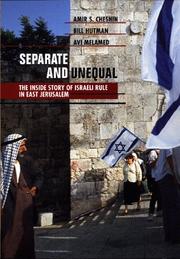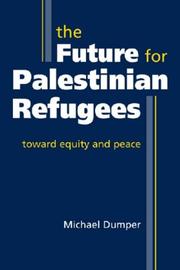| Listing 1 - 10 of 20 | << page >> |
Sort by
|
Book
ISBN: 1642597252 Year: 2022 Publisher: Chicago, Illinois : Haymarket Books,
Abstract | Keywords | Export | Availability | Bookmark
 Loading...
Loading...Choose an application
- Reference Manager
- EndNote
- RefWorks (Direct export to RefWorks)
Light in Gaza gathers a collective Palestinian vision of what a future Gaza could be.
Arab-Israeli conflict. --- Palestinian Arabs --- Palestinian Arabs.
Book
ISBN: 0520389379 Year: 2022 Publisher: Oakland : University of California Press,
Abstract | Keywords | Export | Availability | Bookmark
 Loading...
Loading...Choose an application
- Reference Manager
- EndNote
- RefWorks (Direct export to RefWorks)
Book
ISBN: 0253060842 0253060850 9780253060846 9780253060853 Year: 2022 Publisher: Bloomington, Indiana : Indiana University Press,
Abstract | Keywords | Export | Availability | Bookmark
 Loading...
Loading...Choose an application
- Reference Manager
- EndNote
- RefWorks (Direct export to RefWorks)
"Within the heart of the Jewish city of Tel Aviv, there is a hidden reality-Palestinians who work, study, and live as an unseen minority without access to equal urban citizenship. Grounded in the everyday lives of Palestinians in Tel Aviv, The Invisible Palestinians offers an ethnographic critique of the city's self-proclaimed openness and liberalism. Andreas Hackl reveals that Palestinians' access to the social and economic opportunities afforded in Tel Aviv depends on an invisibility that not only disrupts opportunities for true urban citizenship but also draws opposition from other Palestinians. They are unable to belong in Tel Aviv as Palestinians and struggle to reconcile Tel Aviv with being Palestinian. By looking at the city from the perspective of this hidden urban minority, Hackl uncovers a critical opportunity to imagine and build a more inclusive and just future for Tel Aviv. An important read, The Invisible Palestinians explores the marginalized urban presence of both Palestinian citizens of Israel and Palestinian labourers from the West Bank in this quintessential Jewish Israeli city. Andreas reveals a highly diverse Palestinian population that includes young people, manual workers and middle class professionals, residents and commuters, students, artists, and activists, as well as members of an underground Palestinian LGBT community that carefully navigates their place in a city that refuses to recognize them"--
Palestinian Arabs --- Social integration --- Social conditions. --- Tel Aviv (Israel)

ISBN: 0674029526 9780674029521 0674801369 9780674801363 9780674005532 0674005538 Year: 2022 Publisher: Cambridge, MA
Abstract | Keywords | Export | Availability | Bookmark
 Loading...
Loading...Choose an application
- Reference Manager
- EndNote
- RefWorks (Direct export to RefWorks)
This vivid behind-the-scenes account of Israeli rule in Jerusalem details for the first time the Jewish state's attempt to lay claim to all of Jerusalem, even when that meant implementing harsh policies toward the city's Arab population. The authors, Jerusalemites from the spheres of politics, journalism, and the military, have themselves been players in the drama that has unfolded in east Jerusalem in recent years and appears now to be at a climax. They have also had access to a wide range of official documents that reveal the making and implementation of Israeli policy toward Jerusalem. Their book discloses the details of Israel's discriminatory policies toward Jerusalem Arabs and shows how Israeli leaders mishandled everything from security and housing to schools and sanitation services, to the detriment of not only the Palestinian residents but also Israel's own agenda. Separate and Unequal is a history of lost opportunities to unite the peoples of Jerusalem. A central focus of the book is Teddy Kollek, the city's outspoken mayor for nearly three decades, whose failures have gone largely unreported until now. But Kollek is only one character in a cast that includes prime ministers, generals, terrorists, European and American leaders, Arab shopkeepers, Israeli policemen, and Palestinian schoolchildren. The story the authors tell is as dramatic and poignant as the mosaic of religious and ethnic groups that call Jerusalem home. And coming at a time of renewed crisis, it offers a startling perspective on past mistakes that can point the way toward more equitable treatment of all Jerusalemites.
Palestinian Arabs --- Arab Palestinians --- Arabs --- Arabs in Palestine --- Palestinians --- Ethnology --- Government policy --- Jerusalem --- Politics and government.
Book
ISBN: 9782913112711 Year: 2022 Publisher: [Paris] les Nuits rouges
Abstract | Keywords | Export | Availability | Bookmark
 Loading...
Loading...Choose an application
- Reference Manager
- EndNote
- RefWorks (Direct export to RefWorks)
Sionisme --- Israël --- Histoire --- Palestinian Arabs --- Arab-Israeli conflict. --- History. --- Palestine --- Israel --- Politics and government.
Book
ISBN: 9780429351723 9780367368463 9780367765903 Year: 2022 Publisher: London Routledge
Abstract | Keywords | Export | Availability | Bookmark
 Loading...
Loading...Choose an application
- Reference Manager
- EndNote
- RefWorks (Direct export to RefWorks)
This book examines the factors and issues responsible for the intra-Palestinian conflict that has undermined the strength and vitality of the struggle for liberation against the state of Israel. It explores how the ideological incompatibility and competition for political primacy account for the Hamas–Fatah conflict, entailing the risk of partition of Palestine even before it takes shape as an independent, sovereign entity. It analyzes the developments since the signing of the September 1993 Oslo Accord and discusses themes such as the background of Palestinian politics; the role of Fatah; the rise of Hamas as Fatah’s political rival; the Hamas–Fatah struggle for power; and the role played by the international community, including by the US and the European Union. The study deals with the various facets of territorial and political challenges faced by the rival Palestinian actions; the failure of the reconciliation efforts by Egypt and Yemen; the stalled peace process in the West Bank and Gaza Strip; the emergence of the Islamic resistance movement and secular nationalist party; and the political and ideological shifts in Palestinian politics. Comprehensive and topical, this book will be useful to scholars and researchers of West Asian studies, peace and conflict studies, politics and international relations, foreign policy, political studies, area studies and strategic and defence studies.
Arab-Israeli conflict --- Palestinian Arabs --- Politics and government --- Ḥarakat al-Muqāwamah al-Islāmīyah. --- Palestine
Book
ISBN: 9781503632103 9781503631373 1503632105 9781503632097 1503631370 1503632091 Year: 2022 Publisher: Stanford, California
Abstract | Keywords | Export | Availability | Bookmark
 Loading...
Loading...Choose an application
- Reference Manager
- EndNote
- RefWorks (Direct export to RefWorks)
Palestinians living on different sides of the Green Line make up approximately one-fifth of Israeli citizens and about four-fifths of the population of the West Bank. In both groups, activists assert that they share a single political struggle for national liberation. Yet, obstacles inhibit their ability to speak to each other and as a collective. Geopolitical boundaries fragment Palestinians into ever smaller groups. Crossing a Line enters these distinct environments for political expression and action of Palestinians who carry Israeli citizenship and Palestinians subject to Israeli military occupation in the West Bank, and considers how Palestinians are differently impacted by dispossession, settler colonialism, and militarism. Amahl Bishara looks to sites of political practice—journalism, historical commemorations, street demonstrations, social media, in prison, and on the road—to analyze how Palestinians create collectivities in these varied circumstances. She draws on firsthand research, personal interviews, and public media to examine how people shape and reshape meanings in circumstances of constraint. In considering these different environments for political expression and action, Bishara illuminates how expression is always grounded in place—and how a people can struggle together for liberation even when they cannot join together in protest.
Palestinian Arabs --- Politics and government --- Politics and government. --- Palestine. --- commemoration. --- embodiment. --- militarism. --- political expression. --- prison. --- protest. --- public culture. --- resistance. --- settler colonialism.
Book
ISBN: 0520381319 Year: 2022 Publisher: Oakland, California : University of California Press,
Abstract | Keywords | Export | Availability | Bookmark
 Loading...
Loading...Choose an application
- Reference Manager
- EndNote
- RefWorks (Direct export to RefWorks)
The Olive Branch from Palestine provides a new narrative of the Palestinian effort to end the Israeli-Palestinian conflict and offers a bold plan for ending this conflict today, a proposal that focuses on Palestinian agency and the power of the Palestinians to bring about the two-state solution, even in the absence of a fully committed Israeli partner. In part 1, Jerome Segal provides an analytical and historical study of the 1988 Palestinian Declaration of Independence, a remarkable act of unilateral peacemaking through which the PLO accepted the legitimacy of the 1947 Partition Resolution and thereby redefined Palestinian nationalism. In part 2, he proposes a new strategy in which, outside of negotiations, the Palestinians would advance, in full detail, the end-of-claims/end-of-conflict peace plan they are prepared to sign, one that powerfully addresses the Palestinian refugee question and is supported by the refugees themselves yet does not undermine Israel as a Jewish-majority state.
Palestinian Arabs --- Nationalism --- Arab-Israeli conflict. --- Politics and government. --- Munaẓẓamat al-Taḥrīr al-Filasṭīnīyah. --- Palestine --- History --- Autonomy and independence movements.

ISBN: 158826999X 9781588269997 9781588264749 1588264742 Year: 2022 Publisher: Boulder
Abstract | Keywords | Export | Availability | Bookmark
 Loading...
Loading...Choose an application
- Reference Manager
- EndNote
- RefWorks (Direct export to RefWorks)
From the dilapidated camps of Lebanon to the eye of the storm in Gaza, Palestinian refugees continue to be a focus of world attention. The Future for Palestinian Refugees addresses in depth this most difficult of the outstanding problems impeding peace in the Middle East. Michael Dumper maps the contours of the issue, with special reference to wider international practice and its possible bearings on policy options for the Israeli-Palestinian case. Concentrating on topics central to the future of Palestinian refugees--ranging from international involvement in postconflict agreements, to compensation and resettlement, to justice and reconciliation--he offers an important and positive contribution to thinking on the Middle East peace process.
Refugees, Palestinian Arab. --- Arab-Israeli conflict --- Israel-Arab conflicts --- Israel-Palestine conflict --- Israeli-Arab conflict --- Israeli-Palestinian conflict --- Jewish-Arab relations --- Palestine-Israel conflict --- Palestine problem (1948- ) --- Palestinian-Israeli conflict --- Palestinian Arabs --- Palestinian Arab refugees --- Refugees. --- History
Book
ISBN: 0190060484 0190060492 0197587569 Year: 2022 Publisher: New York, NY : Oxford University Press,
Abstract | Keywords | Export | Availability | Bookmark
 Loading...
Loading...Choose an application
- Reference Manager
- EndNote
- RefWorks (Direct export to RefWorks)
'Prophets without Honor' tells the story of the grueling attempts to solve the Israeli-Palestinian conflict and presents an in-depth examination of the reasons for its resilience. In what is the most non-partisan, comprehensive, and balanced account by an insider representing one of the parties, Shlomo Ben-Ami describes the specific factors that impede a solution to the Israeli-Palestinian conflict and sheds light on the dilemmas that stand at the center of any peace enterprise.
Arab-Israeli conflict --- Palestinian Arabs --- Peace. --- Politics and government --- Israel --- Arab-Israeli peace process --- Mid-East peace process --- Middle East peace process --- Middle Eastern peace process --- Peace process in the Middle East
| Listing 1 - 10 of 20 | << page >> |
Sort by
|

 Search
Search Feedback
Feedback About UniCat
About UniCat  Help
Help News
News